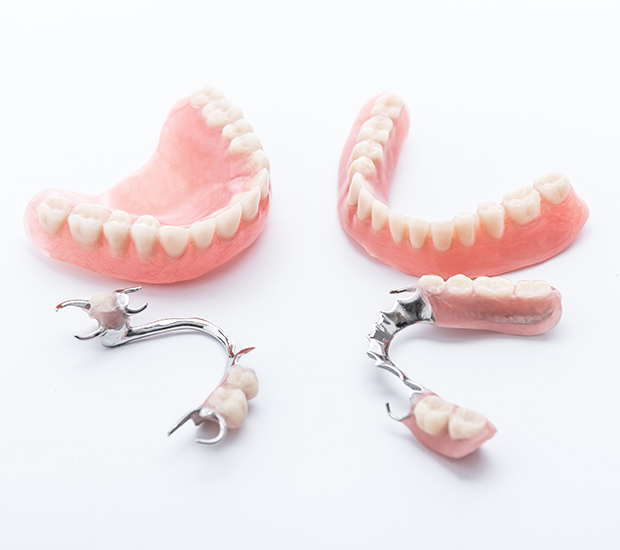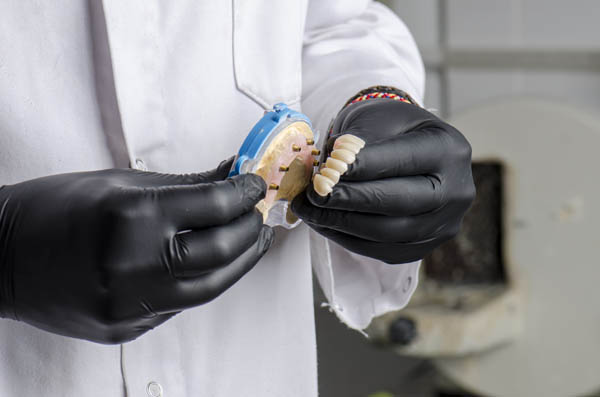Dentures and Partial Dentures Grayslake, IL
When it comes to lost teeth, there are many practical replacement options to restore one's smile. Missing teeth are not just a question of appearance; they also affect the health of the remaining teeth as well as everyday comfort. Dentures and partial dentures are popular tooth replacement options that are customized for an optimal fit.
Dentures and partial dentures are available at Advanced Dental Arts: Rey Martinez DDS in Grayslake and the surrounding area. We use high-quality materials and advanced fitting techniques to support your comfort and dental health. With our help, you can select the type of denture that will work for you.
Get in touch today by calling us at (847) 223-5200 to discuss how dentures can improve your quality of life.
Benefits of Getting Dentures
It is normal for people to be nervous about getting dentures and partial dentures. Replacing teeth is an essential step in a person's journey to achieve the oral health they want. Dentures are natural-looking. When in place, dentures do not look awkward or clunky. Dentures have strong artificial teeth and allow patients to eat many of their favorite foods. Also, this treatment can last for ten years or more, depending on how well the patient will take care of the dentures.
According to WebMD, wearing dentures can improve a person's smile. No longer does the patient have to hide a toothless smile but can instead open up without feeling embarrassed or ashamed. Showing off one's smile can make it more comfortable to meet new people, speak in public, socialize, and get back activities they once did. Dentures will typically not cost as much as some other treatments. Some insurance plans may even cover some of the costs. If your considering dentures, talk with your insurance provider to see what parts of the cost are covered.
Check out what others are saying about our denture and partial denture services on Yelp: Dentures and Partial Dentures Grayslake
Full Dentures
When to Get Complete Dentures
Everyone should be able to enjoy a comfortable use of their mouth and a bright smile. Going through life without teeth may cause unnecessary hardships. Missing teeth can complicate regular activities such as eating, speaking, and even socializing. Fortunately, dentures can solve this concern. If a patient has lost all teeth, or if a dental professional has pulled them all, the person should consider full dentures. At Advanced Dental Arts: Rey Martinez DDS, we can customize the right set of dentures to fit in the person's mouth and provide a natural-looking solution.
Getting Full Dentures
Our team will first discuss the benefits and challenges of wearing both dentures and partial dentures. When the patient is ready to begin the procedure for dentures, X-rays and impressions of the person's mouth will need to be made. There will also be a review of the patient's health history, including current medications and recent surgeries. The impressions will go to a lab where a technician makes the full dentures.
The patient will get the apparatus at the following appointment. During this appointment, the doctor will remove any remaining teeth that need to come out, though this can also be done at a prior date. The dental professional will test the dentures to make sure everything fits properly, and the patient feels comfortable with the dentures in the mouth. The dentist may need to make additional adjustments. Be aware, some kinds of dentures can be ready for fitting right after removing teeth, while others require a patient's gums to be completely healed.
Partial Dentures
When to Get Partial Dentures
As discussed in an article by the Oral Health Foundation, there are key differences between full and partial dentures. Partial dentures are ideal for patients who have lost multiple teeth but still have healthy natural teeth remaining. This option may also be a wise one for a patient who has several decaying teeth that need to be extracted to prevent the spread of infection and other dental problems. This procedure may also be the right option for patients who are concerned about the cost. Although prices can vary depending on insurance, partial dentures can be an affordable tooth replacement option. Patients worried about pain from a dental procedure may feel eased, knowing that the process is often less invasive than other replacement options.
Getting Partial Dentures
The process of getting partial dentures is similar, though the apparatus itself has some differences. Partial dentures are connected by a metal framework to secure them in the person's mouth. The dentist will use a fixed bridge to connect the partial dentures to any remaining natural teeth. This type of denture is also removable.
The patient will make two or three appointments to complete this process. Our team will make sure everything fits well and that the patient can have full mouth function with it. Patients should be prepared to wait a few weeks for the dentures. It takes time for the lab technician to make the appliance based on the molds our dental team makes.
What Material Dentures Are Made Of
One of the most popular reasons why people choose dentures and partial dentures are their resemblance to natural teeth. Dentures consist of a gum-colored base, which is often coated with acrylic or plastic. Other materials may be used in modern denture bases, as discussed in an article originally published in the Contemporary Clinical Dentistry. Artificial teeth attach to the base. The teeth are typically composed of porcelain or a resin, such as acrylic. While there are permanent dentures, most are removable, which can help the patient maintain and clean them efficiently.
Replacement Choices to Discuss
Dentures and partial dentures are two of the most common forms of tooth-replacement treatment. While there are other options available at our practice, we will determine the most effective option for the patient's specific needs. Every patient’s situation and needs a different solution.
With dental bridges and dental implants, there are a variety of factors to consider when deciding on a replacement option. During a consultation, we will answer any questions the patient has about the various options so they can make an informed decision.
Choosing Dentures and Partial Dentures Over Other Treatments
It can be difficult deciding which option is right when deciding on an effective tooth replacement option. Each patient will have to consider the pros and cons while also looking into insurance coverage. During a consultation in our office, we can go into more detail about the specifics. A determining factor is the amount of time a patient can take out of their schedule for treatment.
In most cases, the dental implant process can take several visits over the span of months. With dentures or partial dentures, the patient will most likely need two visits before they can begin wearing their dentures. Along with that, dentures and partial dentures can replace multiple teeth at once as opposed to dental implants, which only replace one at a time.
How to Care for Dentures
Dentures do require ongoing maintenance outside of the typical oral hygiene routine. Many people believe they can set dentures down by the side of the bed. However, this can lead to warping and cracking over time.
Instead, patients should soak dentures overnight. Avoid hot water, as this may also cause warping. Patients who use denture solutions should rinse thoroughly before replacing as denture solutions should not be ingested. Our team can recommend if solution is right for your regimen. Remember never to use these directly in the mouth, either.
It is also important to note that dentures require cleaning, just like regular teeth do. Whenever possible, remove dentures after eating or drinking and rinse them to get rid of food particles. Patients should also brush dentures at least once per day. Dentists recommend a soft-bristled brush as a more abrasive brush may cause damage over time.
Even if no teeth remain, continued dental hygiene is essential. Brush the teeth and gums and floss any remaining teeth. Patients may also use gauze or a soft toothbrush to clean the cheeks, roof of the mouth, and even the tongue. Finally, people who use adhesives should take care to remove this.
Denture Myths Versus Reality
There are many misconceptions about dentures that can stand in the way of people getting the care they need. Learning the facts about some common myths can help patients better understand their options. Talk to our team to get further information and specific advice for your situation.
- Myth #1: Discomfort and irritation is a normal part of having to wear dentures. Today’s techniques allow the creation of dentures that fit well. If you are not comfortable, it is a sign that something is wrong. If this is the case, consult a dentist.
- Myth #2: Getting dentures means not having to return to the dentist again. Even if you no longer have natural teeth, seeing the dentist at least once a year is vital to maintaining oral health. Dentists can identify and treat gum issues and other problems. They can also adjust your dentures and make sure everything is going well.
- Myth #3: Getting dentures means never being able to eat anything besides soft food again. While it can take a little time to adjust to the feel of eating with dentures, many people can enjoy a variety of foods. The dental team can talk to you in further detail about any concerns regarding the potential effect of your diet on your dentures.
Questions Answered on This Page
Q. Are there different types of dentures?
Q. Are there dentures to replace a few of my teeth?
Q. What are the benefits of dentures?
People Also Ask
Q. How do I take care of my dentures?
Q. What do I do if I damage my dentures?
Q. What do I need to know about making adjustments to my dentures?
Definition of Denture Terminology
- Alveolar Bone
- The alveolar bone is the bone surrounding the root of the tooth that keeps the tooth in place.
- Clasp
- A clasp is a device that holds a removable partial denture prosthesis to the teeth.
- Denture Base
- The denture base is the part of the denture that connects the artificial teeth with the soft tissue of the gums.
- Edentulous
- Edentulous is a term that applies to people who do not have any teeth.
- Periodontal Disease
- Periodontal disease is a condition that causes inflammation of the gingival tissues and membrane of the teeth, leading to tooth loss without professional treatment.
- Pontic
- Pontic is another term for an artificial tooth on a fixed partial denture.
- Rebase
- Rebase is the process of refitting denture prosthesis by replacing the base material.
- Reline
- Reline is when a professional resurfaces the surface of the prosthesis with a new base material.
- Resin/Acrylic
- Resin and Acrylic are resinous materials that can be components in a denture base.
- Stomatitis
- Stomatitis is the inflammation of the tissue that is underlying a denture that does not fit properly. It can also result from other oral health factors.
Back to top of Artificial Teeth




